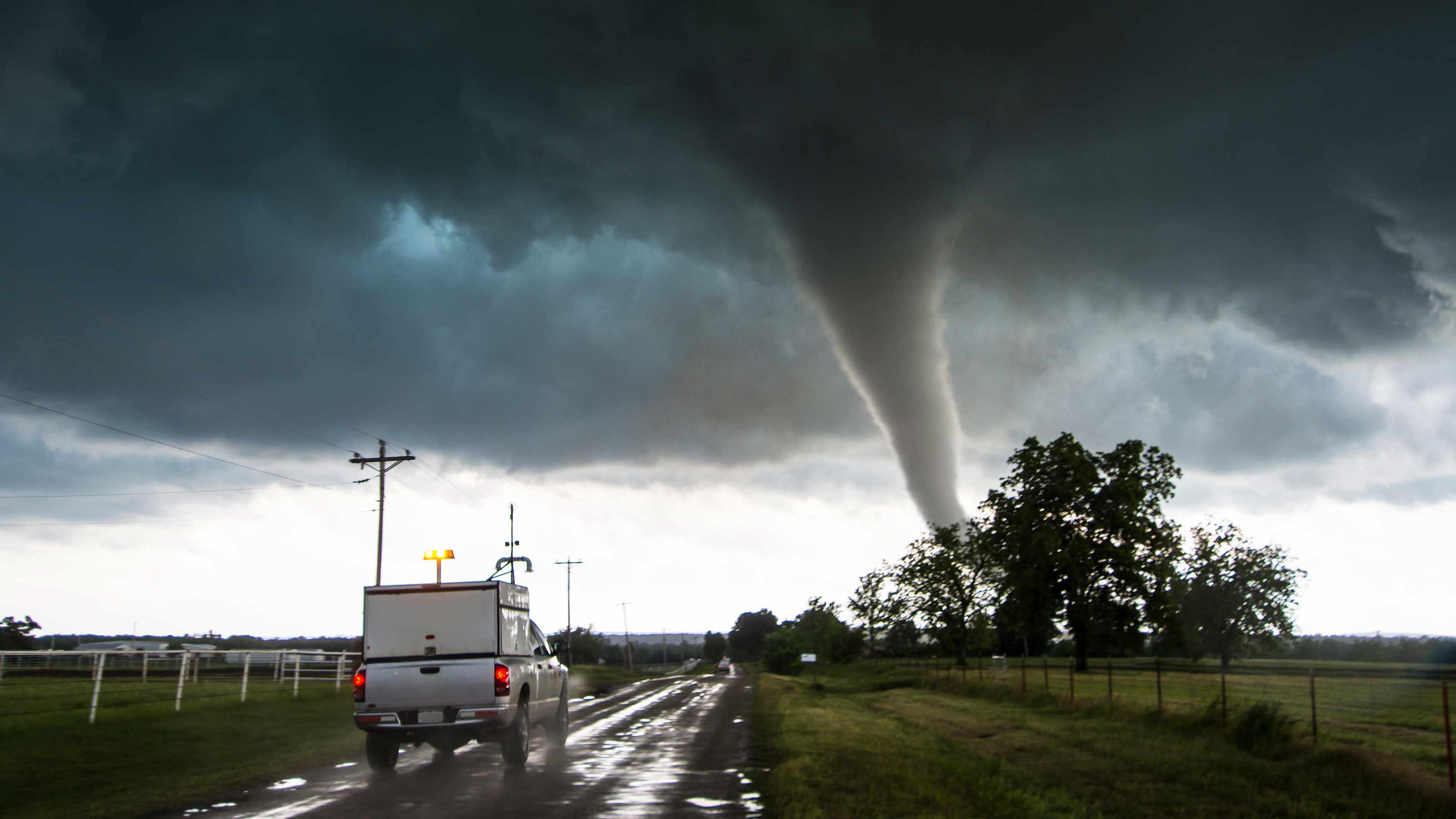Tax Deadlines Extended for Victims of Storms, Tornadoes and Flooding in Oklahoma
FEMA's recent disaster declaration opens the door for extended federal tax filing and payment deadlines for victims of the May storms, tornadoes, and flooding in Oklahoma.


Profit and prosper with the best of Kiplinger's advice on investing, taxes, retirement, personal finance and much more. Delivered daily. Enter your email in the box and click Sign Me Up.
You are now subscribed
Your newsletter sign-up was successful
Want to add more newsletters?
Residents and business in Oklahoma impacted by the severe storms, tornadoes, and flooding beginning May 2, 2022, now have until September 1, 2022, to file and pay certain federal taxes. The IRS extended the deadlines after parts of the state were declared a disaster area by the Federal Emergency Management Agency (FEMA). The tax relief applies to residents and businesses in Adair, Cherokee, Muskogee, Okmulgee, Pottawatomie, Seminole, and Tulsa Counties who were affected by the May 2 natural disasters.
Various federal tax filing and payment due dates for individuals and businesses from May 2 to August 31 will be shifted to September 1, 2022. This includes the quarterly estimated tax payments that were due on June 15, 2022.
The tax relief also applies to the quarterly payroll and excise tax returns normally due on August 1, 2022. Penalties on payroll and excise tax deposits due from May 2 to May 16 will also be waived if the deposits were made by May 17, 2022.
From just $107.88 $24.99 for Kiplinger Personal Finance
Become a smarter, better informed investor. Subscribe from just $107.88 $24.99, plus get up to 4 Special Issues

Sign up for Kiplinger’s Free Newsletters
Profit and prosper with the best of expert advice on investing, taxes, retirement, personal finance and more - straight to your e-mail.
Profit and prosper with the best of expert advice - straight to your e-mail.
Victims of the storms, tornadoes, and flooding in Oklahoma don't have to contact the IRS to get this relief. However, if you receive a late filing or late payment penalty notice from the IRS that has an original or extended filing, payment or deposit due date falling within the postponement period, call the number on the notice to have the penalty abated.
The IRS will also waive fees for obtaining copies of previously filed tax returns for taxpayers affected by the Oklahoma natural disasters. When requesting copies of a tax return or a tax return transcript, write "Oklahoma Severe Storms, Tornadoes and Flooding" in bold letters at the top of Form 4506 (copy of return) or Form 4506-T (transcript) and send it to the IRS.
In addition, the IRS will work with any taxpayer who lives outside Oklahoma, but whose records necessary to meet a deadline occurring during the postponement period are located in the state. Taxpayers qualifying for relief who live in another state need to contact the IRS at 866-562-5227. This also includes workers assisting the relief activities who are affiliated with a recognized government or philanthropic organization, and anyone visiting the area who was killed or injured as a result of the disaster.
Individuals and businesses in a federally declared disaster area who suffered uninsured or unreimbursed disaster-related losses can choose to claim them on either the return for the year the loss occurred (in this instance, the 2022 return that you will file next year), or the return for the prior year. This means that taxpayers can, if they choose, file an amended return to claim these losses on their 2021 return. Be sure to write the FEMA declaration number (DR-4657-OK) on any return claiming a loss. It's also a good idea for affected taxpayers claiming the disaster loss on an amended 2021 return to put the Disaster Designation ("Oklahoma Severe Storms, Tornadoes and Flooding") in bold letters at the top of the form. See IRS Publication 547 for details.
Profit and prosper with the best of Kiplinger's advice on investing, taxes, retirement, personal finance and much more. Delivered daily. Enter your email in the box and click Sign Me Up.
Rocky Mengle was a Senior Tax Editor for Kiplinger from October 2018 to January 2023 with more than 20 years of experience covering federal and state tax developments. Before coming to Kiplinger, Rocky worked for Wolters Kluwer Tax & Accounting, and Kleinrock Publishing, where he provided breaking news and guidance for CPAs, tax attorneys, and other tax professionals. He has also been quoted as an expert by USA Today, Forbes, U.S. News & World Report, Reuters, Accounting Today, and other media outlets. Rocky holds a law degree from the University of Connecticut and a B.A. in History from Salisbury University.
-
 QUIZ: Are You Ready To Retire At 55?
QUIZ: Are You Ready To Retire At 55?Quiz Are you in a good position to retire at 55? Find out with this quick quiz.
-
 10 Decluttering Books That Can Help You Downsize Without Regret
10 Decluttering Books That Can Help You Downsize Without RegretFrom managing a lifetime of belongings to navigating family dynamics, these expert-backed books offer practical guidance for anyone preparing to downsize.
-
 New Ways to Keep Online Accounts Safe
New Ways to Keep Online Accounts SafeAs cybercrime evolves, the strategies you use to protect yourself need to evolve, too.
-
 3 Smart Ways to Spend Your Retirement Tax Refund
3 Smart Ways to Spend Your Retirement Tax RefundRetirement Taxes With the new "senior bonus" hitting bank accounts this tax season, your retirement refund may be higher than usual. Here's how to reinvest those funds for a financially efficient 2026.
-
 5 Retirement Tax Traps to Watch in 2026
5 Retirement Tax Traps to Watch in 2026Retirement Even in retirement, some income sources can unexpectedly raise your federal and state tax bills. Here's how to avoid costly surprises.
-
 Paper Tax Filers Face Long Wait as IRS Digitization Effort Stalls
Paper Tax Filers Face Long Wait as IRS Digitization Effort StallsTax Filing Last April, the IRS launched its Zero Paper Initiative to speed up paper tax return processing. The project isn’t going well.
-
 First the Penny, Now the Nickel? The New Math Behind Your Sales Tax and Total
First the Penny, Now the Nickel? The New Math Behind Your Sales Tax and TotalRounding Tax A new era of "Swedish rounding" hits U.S. registers soon. Learn why the nickel might be on the chopping block, and how to save money by choosing the right way to pay.
-
 Over 65? Here's What the New $6K Senior Tax Deduction Means for Medicare IRMAA
Over 65? Here's What the New $6K Senior Tax Deduction Means for Medicare IRMAATax Breaks A new tax deduction for people over age 65 has some thinking about Medicare premiums and MAGI strategy.
-
 How to Open Your Kid's $1,000 Trump Account
How to Open Your Kid's $1,000 Trump AccountTax Breaks Filing income taxes in 2026? You won't want to miss Form 4547 to claim a $1,000 Trump Account for your child.
-
 In Arkansas and Illinois, Groceries Just Got Cheaper, But Not By Much
In Arkansas and Illinois, Groceries Just Got Cheaper, But Not By MuchFood Prices Arkansas and Illinois are the most recent states to repeal sales tax on groceries. Will it really help shoppers with their food bills?
-
 7 Bad Tax Habits to Kick Right Now
7 Bad Tax Habits to Kick Right NowTax Tips Ditch these seven common habits to sidestep IRS red flags for a smoother, faster 2026 income tax filing.
